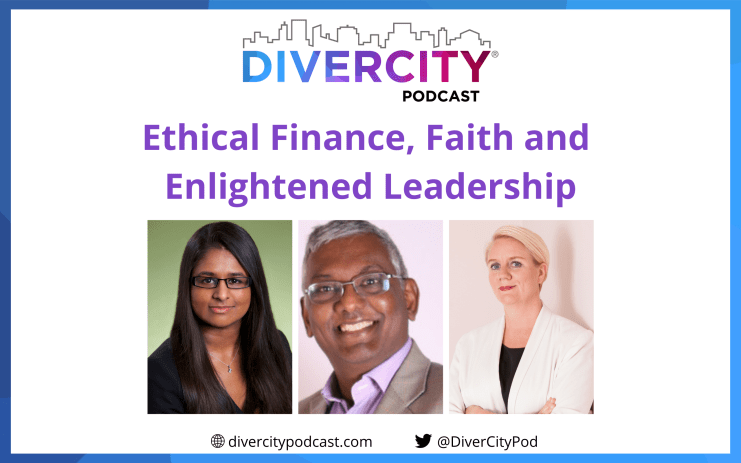
Ethical Finance, Faith and Enlightened Leadership

Faith and enlightened leadership can promote ethical practices and a more inclusive culture in financial services. In a recent episode of DiverCity Podcast, we explored this area in detail with Professor Atul K. Shah and Anjli Shah.
Professor Atul K. Shah is a broadcaster and lecturer at City University. He has written books and research papers on ethical finance, accounting, risk, diversity and sustainability. His books include: ‘The Politics of Risk, Audit & Regulation – A Case Study of HBOS’ and ‘Jainism and Ethical Finance’.
Anjli Shah is an Investment Director at Abrdn. She manages the ASI Global Mid-Cap Equity Fund, while also having lead responsibility for covering US small and mid-cap stocks within the Smaller Companies team. She was highly commended in the Investment Analyst of the Year category at the 2020 Women in Investments Award and was also named as a finalist for the Women in Investment Awards in both Investment Analyst of the Year and Fund Manager of the Year categories in 2021.
Faith plays a significant role in the working lives of both individuals. They draw on their religion Jainism, which emphasises respect for the environment and social justice. In the Indian Dharmic tradition, faith is called Dharma. And Dharma means the science of sustainable living.
Anjli views the Jain religion as one of self-help. That there’s no gods or beings that are suddenly going to make everything right and life will be wonderful, but it’s more about improving oneself as a person.
“When you think about the three guiding principles of Jainism: right belief, right knowledge, and right conduct, all three of those beliefs or principles are applicable to our day-to-day working lives.
“Why are we doing this? Are we doing this for the right reasons? When I think about my role, what motivates me is not money or worldly possessions, but really helping others achieve a sense of financial wellness and security and making sure we do it in the right and ethical manner.”
Atul says that money is a social construct. It was created to help human society grow, to build human relationships, and to help people exchange and trade. Yet he argues that we have made money into an instrument for bullying society into making profits and growing wealth, and the insecurity related to this.
“At a very simple level, I think what I’m trying to do is to bring money back to its origins, to its grassroots, and help people understand the nature and limits of money. And then from that perspective, it’s so much easier to build a finance education where culture is central, with meaning and purpose,” he says.
At the forefront of today’s corporate agenda is sustainability, climate change and the role ESG has to play. The intersection and the interplay between faith and financial services in this regard are thought-provoking.
Some products cater for a religious segment, such as Sharia financial instruments, however, Anjli thinks more in terms of the financial products that we are buying and why we are buying them.
She says: “ESG is now a very topical issue within financial services. A lot of investment houses are launching ESG-friendly products. When you consider what ESG stands for – environmental, social and governance – we want to invest in companies that are well-run, and for the right reasons.”
Atul says good leadership in finance begins with a sense of responsibility and accountability to society. However, the conventional model in finance is to maximise profits, and so there is an immediate inconsistency between a good leadership model and “this kind of selfish capitalistic green and profit maximisation”.
With that said, Professor Shah argues that faith can play into enlightened leadership, as it “gives people a conscience, an almost innate sense of responsibility to others”.
Meanwhile, Anjli believes qualities that make a good leader include being open and transparent and a willingness to listen to others and improve one’s knowledge because a business is only as good as its employees and how it treats other people, including customers.
“The more you display these characteristics and behaviours, the more you get out of your employees and the better you’re perceived,” they say.
Yet both Atul and Anjli explain they tend not to overly express their faith but are vocal in the importance of promoting religious diversity within financial services.
Anjli sums up: “When we think about diversity and inclusion, it’s very tempting to put people into boxes or label them, but actually, all aspects of diversity and inclusion are interconnected. Having that diversity of background, thought, etc, is really important when thinking about how to improve diversity and inclusion in the City.
“For me it’s about trying to level the playing field. We know that certain backgrounds may have had an advantage when getting a foot in the door for job applications in the City, or perhaps to get promoted faster. It’s not to say that others are incapable or that we should have some kind of tokenism that means we’re lowering the standards for everyone. No. It’s about having a level playing field to make sure that there are equal opportunities for everyone to realise their true potential.”
Faith is an incredible vessel to celebrate cultural differences, and if efforts to promote the values of diversity within financial services are to be successful, then religion and faith must always remain part of the conversation.